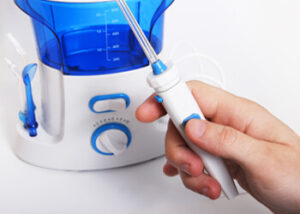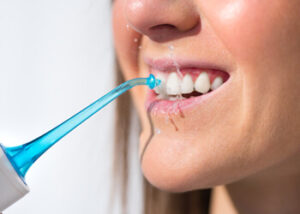A water flosser or oral irrigator has become popular in recent years as a way to make flossing easier, but does it work? Let’s find out.
Are water flossers effective?
A water flosser is a handheld device that directs powerful jets of water at your gums to clean the spaces between your teeth and below your gum line, which are too small for even the finest bristles to reach. It’s not a substitute for brushing, but it does complement and improve your oral hygiene regime.
Bleeding gums
If your gums are sensitive and tend to bleed when you use string floss, there’s no need to worry. You can still remove plaque and food particles from your mouth effectively by using a water flosser instead. Water flossers are a great option for people with sensitive gums because they are gentle and won’t cause any irritation or bleeding.
 Limited mobility
Limited mobility
Some patients might not be able to use the standard dental floss because of reduced mobility in their hands. This includes people with arthritis or Parkinson’s disease, as well as those who have carpal tunnel syndrome. If you are one of these patients, don’t worry- there are alternative methods of flossing that can accommodate your needs!
Water flossing is easy: just point the device towards your gum line and let it do its job.
Gum disease/ gum pain
Although you might floss regularly, if your technique is not perfect, it can cause problems. If you suffer from gum disease, you must take the time to carefully clean between your teeth as plaque build-up and bacteria growth could lead to gingivitis or periodontitis—both of these gum diseases are difficult to manage.
In addition, patients with periodontal pockets require more extensive cleaning than traditional flossing can offer. A water flosser can clean the gum pockets thoroughly and deeply, promoting better bacteria control in your mouth.
Lost or missing teeth
If you have lost teeth due to dental decay, then plaque removal is something you would want to take seriously. While it’s possible that your flossing technique isn’t as well developed as it could have been in the past, a water flosser may help improve your ability to remove plaque going forward.
A water flosser may be a more practical way for patients with dental implants or bridges to remove plaque from around their teeth. Traditional methods of brushing and flossing can be difficult to maneuver in the tight spaces created by these devices, but a water flosser is much more effective.
Wear braces
If you have braces, oral hygiene is key to keeping your smile healthy and white. However, it can be more difficult to brush and floss around all the brackets and wires. However, it can be more difficult to brush and floss around all the brackets and wires.
Having braces comes with the daily challenge of removing trapped food and plaque. A water flosser can make the process not only easier but faster and more effective.
Is a water flosser suitable for kids?
Parents often feel frazzled when teaching their kids about oral care. Kids never seem to want to brush or floss at the right time, and it can be tough getting them to use the correct techniques. With such small pieces of string, flossing is an extra challenge for young children who haven’t yet developed fine motor skills.
What works better? Water floss vs manual floss
According to users, water flossers make your mouth feel fresher than regular dental floss or floss picks because they’re more effective at removing plaque. Studies have shown that 29% more plaque is removed with a water flosser than with traditional string floss.
How to use a water flosser?
Although it may be messy at first, learning how to use a water flosser is easy! Follow the steps below to get started:
- Fill your reservoir with lukewarm water, and then add a small cup of mouthwash in it twice a week to maintain oral health.
- Depending on which model you purchase, your water flosser will come with a variety of tips to choose from. These include a classic jet tip, plaque seeker tip, toothbrush tip, orthodontic tip, pick tip etc. Select the one that suits your needs best.
- First, take the tip and insert it into the handle of your device. Then, find a way to lock the tip in place by either twisting it or pressing a button on the handle itself. If you can’t figure it out, consulting the product manual should give you more clarity.
- Use the toothbrush tip on your back teeth instead of touching them directly. You may want to do this over the sink, so you don’t accidentally splash water. Start wherever you’d like, but be sure every interdental area is covered.
- Turn on your water flosser. To do so, you will either press an ‘on’ button or rotate a dial to increase the water pressure. Start with a low-pressure setting and gradually increase it until you find a comfortable middle ground between too much and not enough pressure.
- For each tooth, use your gum line as a guide and go slowly to make sure you remove all food and tartar residue. You should focus on the top of the tooth, the baseline of the gum, and the space between each tooth. For every two seconds that you spend cleaning one side of a tooth, hold the water over that area for another two seconds before moving on. When you’re done with both sets of teeth (the outside and inside), it should take you about two minutes in total.
- Finally, pour out any water that is left over in the reservoir. If you leave old water in your reservoir, it can lead to bacterial growth
That’s all there is to it! You’ve just learned how to use a water flosser.
Should You Floss Before Or After Brushing?
Whether you floss before or after brushing your teeth doesn’t matter as much as making sure to do it every day. If you choose to floss first, plaque and any missed debris from brushing can be removed more easily. The most vital part is just remembering to do it at least once a day– the method isn’t nearly as important.
If you have questions about water flossers, such as “Do water flossers work,” it’s always best to ask your dentist. You can easily schedule an appointment with our friendly dentists at Infinity Dental Care by calling us at (02) 9159 6237.
References
What is a Waterpik?
https://www.webmd.com/oral-health/what-is-waterpik
Waterpik vs flossing: pros and cons
https://www.healthline.com/health/dental-and-oral-health/waterpik-vs-flossing


 Limited mobility
Limited mobility